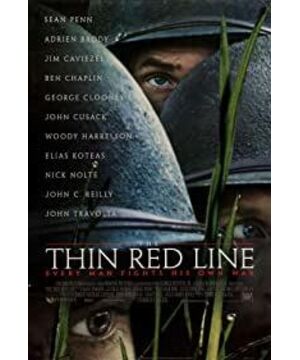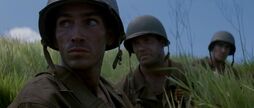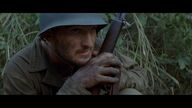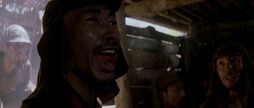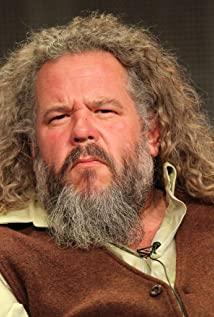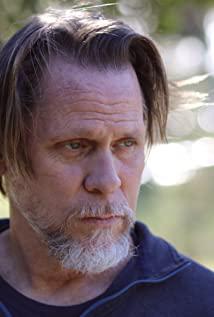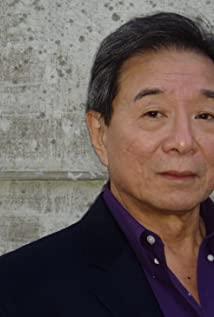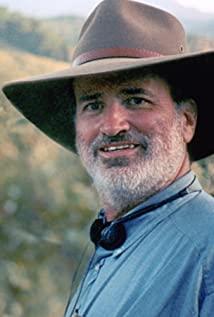war! war! Every director wants to make a war movie, a real war movie! Kubrick said something similar. He made the anti-war black comedy "Dr. Strangelove" in 1964, but it was not enough. He wanted to make a war film from the front, so he had "Full Metal Shell" in 1987. ". One of the themes of almost all war films is anti-war, except for wartime propaganda films and various themed war films. In fact, although the themes of many war blockbusters use the cruelty of war to show humanity and anti-war, they are actually selling visual stimulation, personal heroism and same-sex friendship. hero! brother! Shock! It seems that every male director wants to have a solid war blockbuster on their resume, even female directors. Catherine Bigelow's "The Hurt Locker" is a great Oscar winner, and it's full of toughness. Not like it came from a woman. A "hermit" like Terrence Malick, what kind of scenes, senses, and heroic excitement are there? After 20 years of no work, he directed the tube again and made this real war film "Slim The Red Line". Since it is produced by Terrence, it naturally does not take the usual path. As it turned out, it was robbed of all the limelight by "Saving Private Ryan," directed by Spielberg that same year. At the Oscars, films that are more popular, innovative but generally disciplined are more likely to win, and "The Thin Red Line" seems to be a foregone conclusion. It is significantly different from Saving Private Ryan, and these differences are exactly what Terrence has always done. Who says war movies can't have poetry? Who says questioning war is pointless? For the same war, Terrence wants a different landscape—a landscape of war, a landscape of human nature, and a landscape of ideas. Avoiding the reasons for war exists, putting on anti-war flags, injecting heroism, visual bombardment, hormone-filled masculinity, etc., most war movies are like this. They are anti-war, but they avoid questioning it, and to a certain extent, they recognize the rationality and inevitability of war. Of course, Terrence will not denounce war to a certain group. What he sends is a philosophical question mark, asking the relationship between life and war with a concrete war. Some people call "The Thin Red Line" "Saving Private Ryan" infused with philosophical ideas, and this comment may be a compliment to both. Strictly speaking, whether this statement is positive or negative, "The Thin Red Line" has a unique quality that makes it stand out from the crowd, different from and better than most war films. Terrence injected his poetry and philosophy into World War II, so there was a film version of "The Thin Red Line". The true portrayal of the fragile side of human nature in war is very different from the image of the brave soldiers in domestic war films, and is similar to "Iwo Jima's Family Letter" and so on. Compared with the movie, it is also a few streets away. The climax of the film, if the ending part must be regarded as the climax, seems to inevitably step into the stereotype of heroism. Here, the starting point of the characters in the film is not heroism. His despair prompted him to make a decision to sacrifice his life, thus completing the story of a lone hero. Terrence had no intention of creating a dramatic climax, and the event ostensibly ended, while Terrence's questioning of himself and the war, and the film's torture of the audience, continued to float in the air. Questions such as "Why are there wars between people", which are often ignored in daily life, come to the viewer at this moment, and are no longer metaphysical and unreasonable questions. In the film, World War II was not over at that time, and now there are still wars off-screen, and everything continues. Like Terrence's previous works "Bad Mountains and Bad Waters" and "Days in Heaven", "The Thin Red Line" has a lot of narration. The director endows the characters with poetic delicacy and philosopher's thinking, spitting out those indifferent or sensitive or abstract words one by one. With the aid of narration, usually due to the need for dialogue and pictures. Only with additional narration can the expression be enriched and completed. Turning to narration because the picture is "poor in words" is often the case with movies adapted from famous books. Narration can become a drag if used incorrectly. The narration in Terrence's films is integrated with the picture, as if born of it. The information revealed by the narrator completes the narrative and lyric together with the picture. The wind blows and the grass moves, showing a beautiful scenery, and a hidden muzzle. The most beautiful scenery is connected with the cruelest killing. All people have a face? All evil and beauty come from the same body? The vines on the tree are desperately entangled in the tree, absorbing nutrients frantically, this is the criterion, not harmony, nature is always cruel. "The Thin Red Line" is a poem about war impressions written by a soldier who is a poet. It is not a memoir of the general's pride, nor is it a painful past that ordinary soldiers can't bear to look back on. The lineup of the film is extremely luxurious, and many big names are willing to play a role, big or small, in Terrence Malick's film. This is not "The Great Cause of the People's Republic of China". Movie Love: George Clooney, Sean Penn, Adrien Brody, John Cusack, Woody Harrelson and more. , the incident is apparently over, and Terrence's questioning about himself and the war, and the film's torture of the audience continue to float in the air. Questions such as "Why are there wars between people", which are often ignored in daily life, come to the viewer at this moment, and are no longer metaphysical and unreasonable questions. In the film, World War II was not over at that time, and now there are still wars off-screen, and everything continues. Like Terrence's previous works "Bad Mountains and Bad Waters" and "Days in Heaven", "The Thin Red Line" has a lot of narration. The director endows the characters with poetic delicacy and philosopher's thinking, spitting out those indifferent or sensitive or abstract words one by one. With the aid of narration, usually due to the need for dialogue and pictures. Only with additional narration can the expression be enriched and completed. Turning to narration because the picture is "poor in words" is often the case with movies adapted from famous books. Narration can become a drag if used incorrectly. The narration in Terrence's films is integrated with the picture, as if born of it. The information revealed by the narrator completes the narrative and lyric together with the picture. The wind blows and the grass moves, showing a beautiful scenery, and a hidden muzzle. The most beautiful scenery is connected with the cruelest killing. All people have a face? All evil and beauty come from the same body? The vines on the tree are desperately entangled in the tree, absorbing nutrients frantically, this is the criterion, not harmony, nature is always cruel. "The Thin Red Line" is a poem about war impressions written by a soldier who is a poet. It is not a memoir of the general's pride, nor is it a painful past that ordinary soldiers can't bear to look back on. The lineup of the film is extremely luxurious, and many big names are willing to play a role, big or small, in Terrence Malick's film. This is not "The Great Cause of the People's Republic of China". Movie Love: George Clooney, Sean Penn, Adrien Brody, John Cusack, Woody Harrelson and more. , the incident is apparently over, and Terrence's questioning about himself and the war, and the film's torture of the audience continue to float in the air. Questions such as "Why are there wars between people", which are often ignored in daily life, come to the viewer at this moment, and are no longer metaphysical and unreasonable questions. In the film, World War II was not over at that time, and now there are still wars off-screen, and everything continues. Like Terrence's previous works "Bad Mountains and Bad Waters" and "Days in Heaven", "The Thin Red Line" has a lot of narration. The director endows the characters with poetic delicacy and philosopher's thinking, spitting out those indifferent or sensitive or abstract words one by one. With the aid of narration, usually due to the need for dialogue and pictures. Only with additional narration can the expression be enriched and completed. Turning to narration because the picture is "poor in words" is often the case with movies adapted from famous books. Narration can become a drag if used incorrectly. The narration in Terrence's films is integrated with the picture, as if born of it. The information revealed by the narrator completes the narrative and lyric together with the picture. The wind blows and the grass moves, showing a beautiful scenery, and a hidden muzzle. The most beautiful scenery is connected with the cruelest killing. All people have a face? All evil and beauty come from the same body? The vines on the tree are desperately entangled in the tree, absorbing nutrients frantically, this is the criterion, not harmony, nature is always cruel. "The Thin Red Line" is a poem about war impressions written by a soldier who is a poet. It is not a memoir of the general's pride, nor is it a painful past that ordinary soldiers can't bear to look back on. The lineup of the film is extremely luxurious, and many big names are willing to play a role, big or small, in Terrence Malick's film. This is not "The Great Cause of the People's Republic of China". Movie Love: George Clooney, Sean Penn, Adrien Brody, John Cusack, Woody Harrelson and more.
View more about The Thin Red Line reviews


